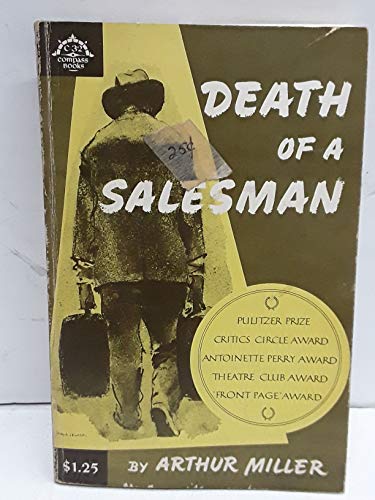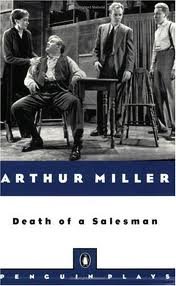-
Death of a Salesman: Certain Private Conversations in Two Acts and a Requiem
Arthur Miller, C. W. E. Bigsby
Hardcover (San Val, May 15, 1998)In the spring of 1948, Arthur Miller retreated to a log cabin in Connecticut with the first two lines of a new play already fixed in his mind. He emerged six weeks later with the final script of "Death of a Salesman" - a painful examination of American life and consumerism. Opening on Broadway the following year, Miller's extraordinary masterpiece changed the course of modern theatre. In creating Willy Loman, his destructively insecure anti-hero, Miller himself defined his aim as being 'to set forth what happens when a man does not have a grip on the forces of life.'
-
Death of a Salesman by Arthur Miller
Arthur Miller
Paperback (Compass Books, March 15, 1699)None
-
Death of a Salesman
Arthur Miller
Paperback (Penguin Books Ltd, Oct. 15, 1969)None
-
Death of a Salesman
Arthur Miller
Paperback (Penguin Books Ltd, Sept. 28, 1989)Death of a Salesman (Penguin Twentieth Century Classics)
-
Death of a Salesman 1st
Arthur Miller
Paperback (Penguin Plays, March 15, 1997)None
-
Death of a Salesman
Arthur Miller
Hardcover (Viking Adult, April 30, 1981)Willy Loman returns home exhausted after a cancelled business trip. Worried over Willy's state of mind and recent car accident, his wife Linda suggests that he ask his boss Howard Wagner to allow him to work in his home city so he will not have to travel. Willy complains to Linda that their son, Biff, has yet to make good on his life. Despite Biff's promising showing as an athlete in high school, he flunked senior-year math and never went to college. Biff and his brother Happy, who is temporarily staying with Willy and Linda after Biff's unexpected return from the West, reminisce about their childhood together. They discuss their father's mental degeneration, which they have witnessed in the form of his constant indecisiveness and daydreaming about the boys' high school years. Willy walks in, angry that the two boys have never amounted to anything. In an effort to pacify their father, Biff and Happy tell their father that Biff plans to make a business proposition the next day. Death of a Salesman is a 1949 play written by American playwright Arthur Miller. It was the recipient of the 1949 Pulitzer Prize for Drama and Tony Award for Best Play. The play premiered on Broadway in February 1949, running for 742 performances, and has been revived on Broadway four times, winning three Tony Awards for Best Revival. It is widely considered to be one of the greatest plays of the 20th century.
-
Death of a Salesman
Arthur Miller
Unknown Binding (Viking Press, March 15, 1949)Death of a Salesman is a 1949 play written by American playwright Arthur Miller. It was the recipient of the 1949 Pulitzer Prize for Drama and Tony Award for Best Play. The play premiered on Broadway in February 1949, running for 742 performances, and has been revived on Broadway four times, winning three Tony Awards for Best Revival.
-
Death of a Salesman
Arthur Miller
Paperback (Viking Adult, May 18, 1949)Miller, Arthur
-
Death of a salesman: certain private conversations in two acts and a requiem
Arthur MILLER
Hardcover (Cresset Press, March 15, 1949)Death of A Salesman
-
Death of a Salesman
Arthur Miller
Unknown Binding (Bantam 952, March 15, 1951)None
-
Death of a salesman;: Certain private conversations in two acts and a requiem
Arthur Miller
Unknown BindingNone
-
Death Of A Salesman
Arthur Miller
Paperback (The Viking Press, March 15, 1966)Ever since it was first performed in 1949, Death of a Salesman has been recognized as a milestone of the American theater. In the person of Willy Loman, the aging, failing salesman who makes his living riding on a smile and a shoeshine, Arthur Miller redefined the tragic hero as a man whose dreams are at once insupportably vast and dangerously insubstantial. He has given us a figure whose name has become a symbol for a kind of majestic grandiosity-and a play that compresses epic extremes of humor and anguish, promise and loss, between the four walls of an American living room.